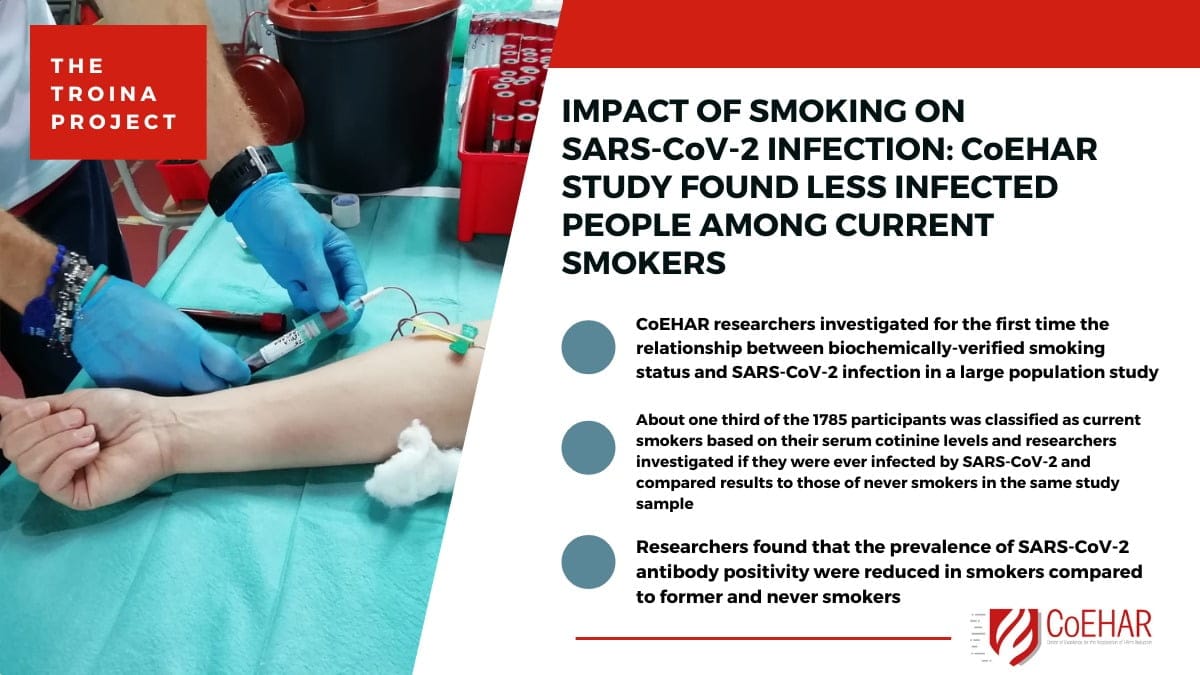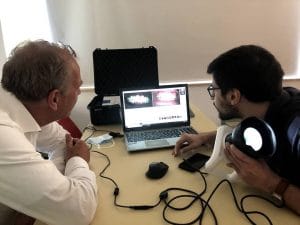CoEHAR researchers investigated for the first time the relationship between biochemically-verified smoking status and SARS-CoV-2 infection in a large population study. The study, conducted on residents and healthcare workers in the Sicilian town of Troina from March to June 2020, found a much lower proportion of positive SARS-CoV-2 specific antibodies among current smokers, suggesting a reduced prevalence of the infection. This counter-intuitive finding may pave the way for research and development of novel nicotine-based treatment for human viral infection
Link to the study: https://link.springer.com/article/10.1007/s11739-022-02975-1
Catania, 14 April 2022– CoEHAR, in partnership with Duke University (USA) and thanks to the collaboration with the research institute IRCCS “Oasi di Troina” and the municipality of the city of Troina, carried out a sero-epidemiological population study through a probabilistic large sample stratified by sex and age and all the healthcare workers of research institute IRCCS Oasi Maria SS. of Troina.
About one third of the 1785 participants was classified as current smokers based on their serum cotinine levels and researchers investigated if they were ever infected by SARS-CoV-2 and compared results to those of never smokers in the same study sample.
The study “The effect of laboratory-verified smoking on SARS-CoV-2 infection: results from the Troina sero-epidemiological survey”, found that the prevalence of SARS-CoV-2 antibody positivity were reduced in smokers compared to former and never smokers (19.8% vs. 31%). This reduced prevalence persisted after adjusting for possible confounders (such as sex, age, previous infection, chronic conditions, and risk group).
By biochemically confirming the smoking status, the CoEHAR researchers have clarified once and for all conflicting findings of previous research on the association between cigarette smoking and risk of SARS-CoV-2 infection.
“Compared to non-smokers, people who have been objectively proven to smoke appears to be less susceptible to the development of SARS-CoV-2 infections. These results are in agreement with previous data showing that self-reported smoking is associated with a reduction of markers of SARS-CoV-2 infection. Our findings support the view that ground-breaking new nicotine-based pharmaceutical applications may prevent the infection” – explained Prof. Riccardo Polosa, Founder of the CoEHAR.
According to Venera Tomaselli, professor of Social Statistics at the University of Catania and member of the CoEHAR: “I was surprised to see that smoking was associated with a much lower prevalence of SARS-CoV-2 antibody positivity. Nonetheless, it must be emphasized that smoking is an unhealthy lifestyle that kills about 8 millions people every year, twice as much as COVID-19!”
THE STUDY
The Troina project defines a cohort study conducted between July and September 2020 in Troina, a municipality of Sicily who has been declared “red zone” due the rapid spread of the infection. Considering the high number of infected, researchers wanted to investigate the incidence of Covid-19 infection through serological tests on the general population and the healthcare workers of IRCCS “Oasi di Troina”.
To detect the status of smokers, it was decided to associate the declarations of the participants with the identification of a specific biological indicator, cotinine, a serum metabolite of nicotine.
A total of 1785 cotinine-verified subjects entered the study: 1312 (73.5%) subjects were sampled from the town of Troina; while 473 (26.5%) constituted the healthcare population enrolled in the IRCCS “Oasi di Troina”. Specifically, the majority of participants was female (61.4%), with a mean age of 50 years, and 56.1% had at least one chronic disease.
The overall proportion of subjects with positive serology for SARS-CoV-2-specific IgG was 5.4%. No significant sex or age differences in antibody response were observed.
Concordance between self-reported smoking history and serum cotinine threshold was very high, with values equal to 97.1% in former smokers and 98.7% in non-smokers. As regards the relationship between SARS-CoV-2 infection and smoking, the prevalence of SARS-CoV-2 IgG positivity was significantly lower in current smokers (19.8%) than comparators.




